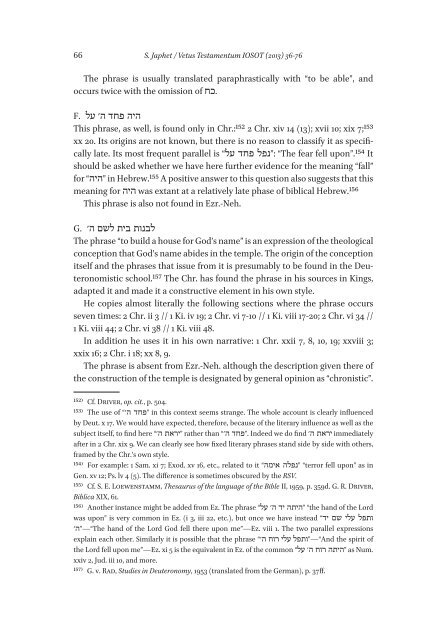Special Issue IOSOT 2013 - Books and Journals
Special Issue IOSOT 2013 - Books and Journals
Special Issue IOSOT 2013 - Books and Journals
Create successful ePaper yourself
Turn your PDF publications into a flip-book with our unique Google optimized e-Paper software.
66 S. Japhet / Vetus Testamentum <strong>IOSOT</strong> (<strong>2013</strong>) 36-76<br />
The phrase is usually translated paraphrastically with “to be able”, <strong>and</strong><br />
.כח occurs twice with the omission of<br />
היה פחד ה׳ על .F<br />
This phrase, as well, is found only in Chr.:152 2 Chr. xiv 14 (13); xvii 10; xix 7;153<br />
xx 20. Its origins are not known, but there is no reason to classify it as specifically<br />
late. Its most frequent parallel is פחד על“ :”נפל “The fear fell upon”.154 It<br />
should be asked whether we have here further evidence for the meaning “fall”<br />
for ”היה“ in Hebrew.155 A positive answer to this question also suggests that this<br />
meaning for היה was extant at a relatively late phase of biblical Hebrew.156<br />
This phrase is also not found in Ezr.-Neh.<br />
לבנות בית לשם ה׳ .G<br />
The phrase “to build a house for God’s name” is an expression of the theological<br />
conception that God’s name abides in the temple. The origin of the conception<br />
itself <strong>and</strong> the phrases that issue from it is presumably to be found in the Deuteronomistic<br />
school.157 The Chr. has found the phrase in his sources in Kings,<br />
adapted it <strong>and</strong> made it a constructive element in his own style.<br />
He copies almost literally the following sections where the phrase occurs<br />
seven times: 2 Chr. ii 3 // 1 Ki. iv 19; 2 Chr. vi 7-10 // 1 Ki. viii 17-20; 2 Chr. vi 34 //<br />
1 Ki. viii 44; 2 Chr. vi 38 // 1 Ki. viii 48.<br />
In addition he uses it in his own narrative: 1 Chr. xxii 7, 8, 10, 19; xxviii 3;<br />
xxix 16; 2 Chr. i 18; xx 8, 9.<br />
The phrase is absent from Ezr.-Neh. although the description given there of<br />
the construction of the temple is designated by general opinion as “chronistic”.<br />
152) Cf. Driver, op. cit., p. 504.<br />
153) The use of ה׳“ ”פחד in this context seems strange. The whole account is clearly influenced<br />
by Deut. x 17. We would have expected, therefore, because of the literary influence as well as the<br />
subject itself, to find here ה׳“ ”יראת rather than ה׳“ .”פחד Indeed we do find יראת ה׳ immediately<br />
after in 2 Chr. xix 9. We can clearly see how fixed literary phrases st<strong>and</strong> side by side with others,<br />
framed by the Chr.’s own style.<br />
154) For example: 1 Sam. xi 7; Exod. xv 16, etc., related to it אימה“ ”נפלה “terror fell upon” as in<br />
Gen. xv 12; Ps. lv 4 (5). The difference is sometimes obscured by the RSV.<br />
155) Cf. S. E. Loewenstamm, Thesaurus of the language of the Bible II, 1959, p. 359d. G. R. Driver,<br />
Biblica XIX, 61.<br />
156) Another instance might be added from Ez. The phrase יד ה׳ על“ ”היתה “the h<strong>and</strong> of the Lord<br />
ותפל עלי שם יד“ was upon” is very common in Ez. (i 3, iii 22, etc.), but once we have instead<br />
The“—”ה׳ h<strong>and</strong> of the Lord God fell there upon me”—Ez. viii 1. The two parallel expressions<br />
explain each other. Similarly it is possible that the phrase עלי רוח ה׳“ And“—”ותפל the spirit of<br />
the Lord fell upon me”—Ez. xi 5 is the equivalent in Ez. of the common רוח ה׳ על“ ”היתה as Num.<br />
xxiv 2, Jud. iii 10, <strong>and</strong> more.<br />
157) G. v. Rad, Studies in Deuteronomy, 1953 (translated from the German), p. 37ff.








![Am HaSefer [Volk des Buches] - Books and Journals](https://img.yumpu.com/20648352/1/174x260/am-hasefer-volk-des-buches-books-and-journals.jpg?quality=85)







